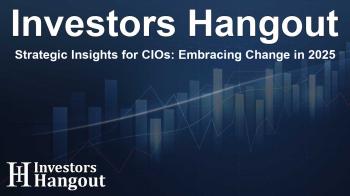Strategic Insights for CIOs: Embracing Change in 2025

CIOs in 2025: A Roadmap for Success
Info-Tech Research Group, a recognized leader in IT research and advisory, has recently published its CIO Priorities 2025 report. This valuable document synthesizes data from comprehensive research surveys, diagnostics, and insightful interviews with industry executives. It highlights the evolving focus areas for IT departments, underscoring foundational improvements in areas like AI, cybersecurity, data quality, and strategic workforce management. The report serves as a guide for CIOs aiming to navigate their organizations through the turbulence of technological advancements.
Understanding the Context of CIO Priorities
The report, titled CIO Priorities 2025, outlines key strategies that CIOs should adopt in order to lead their organizations through the complexities created by the accelerating pace of digital transformation fueled by AI. It provides actionable insights that help IT leaders effectively balance the pursuit of new opportunities with the need for proactive risk management, ultimately driving sustainable growth.
The Evolving Role of the CIO
As digital transformation continues to reshape businesses worldwide, CIOs must now evolve from traditional IT management roles. They are urged to become strategic leaders who drive transformation across the organization. By adopting emerging technologies and fostering agility within their teams, CIOs can not only mitigate risks but also unlock new channels for innovation and long-term organizational success.
Key Priorities for CIOs in 2025
The CIO Priorities 2025 report identifies five key priorities that CIOs need to focus on to thrive in an era marked by rapid technological change:
1. Distributing Data and AI Access
A top concern for CIOs is ensuring high-quality data, which is fundamental for effective AI utilization. Implementing robust data governance frameworks will enhance data accuracy and reliability, thus empowering teams to leverage AI responsibly while minimizing the risk of data silos.
2. Developing a Future-Proof Workforce
CIOs are called to foster a knowledge-driven culture by continuously upskilling employees and promoting knowledge-sharing initiatives. This proactive approach strengthens workforce adaptability, enabling teams to make informed decisions amidst disruptive technologies.
3. Extending Security with Zero Trust Principles
Given the rise of AI-enabled cyber threats, organizations are highly encouraged to adopt Zero Trust security models. These emphasize continuous identity verification, which is essential for fortifying defenses against potential vulnerabilities.
4. Proactively Identifying Technology Risks
To navigate the challenges associated with rapidly evolving technologies, including AI and quantum computing, CIOs must implement principle-based risk management strategies. By conducting early risk assessments, they can foster a smoother adoption of new technologies.
5. Building Cross-Functional Product Teams
CIOs are advised to collaborate closely with business leaders to ensure alignment between IT initiatives and organizational goals. Establishing cross-functional product teams enables faster AI deployment and enhances IT’s role as a strategic partner driving measurable outcomes.
Embracing Change for Future Success
Info-Tech's CIO Priorities 2025 report equips CIOs with practical strategies to harmonize innovation with responsible governance. By prioritizing initiatives ranging from implementing Zero Trust security to cultivating a culture of data utilization, these insights position organizations to seize emerging opportunities while managing associated risks.
About Info-Tech Research Group
Info-Tech Research Group stands as one of the leading research and advisory firms globally, catering to over 30,000 IT and HR professionals. With nearly 30 years of experience, the firm offers unbiased, highly relevant research and advisory services, assisting leaders in making timely and strategic decisions for their organizations.
Frequently Asked Questions
What are the main priorities for CIOs in 2025?
The key priorities include distributing data and AI access, developing a future-proof workforce, extending security through Zero Trust principles, proactively identifying technology risks, and building cross-functional product teams.
How can CIOs effectively manage emerging technology risks?
CIOs can adopt principle-based risk management strategies to proactively identify and address risks, ensuring smoother technology adoption while driving innovation.
What role does data governance play in AI?
Data governance is essential for ensuring data accuracy and reliability, which empowers teams to utilize AI responsibly and prevents potential data silos and security issues.
Why is workforce development important for CIOs?
Developing a knowledgeable and adaptable workforce enhances decision-making capabilities and prepares employees to handle disruptive technologies effectively.
What is the Zero Trust security model?
The Zero Trust security model emphasizes continuous identity verification to enhance security and protect organizations from emerging cyber threats.
About Investors Hangout
Investors Hangout is a leading online stock forum for financial discussion and learning, offering a wide range of free tools and resources. It draws in traders of all levels, who exchange market knowledge, investigate trading tactics, and keep an eye on industry developments in real time. Featuring financial articles, stock message boards, quotes, charts, company profiles, and live news updates. Through cooperative learning and a wealth of informational resources, it helps users from novices creating their first portfolios to experts honing their techniques. Join Investors Hangout today: https://investorshangout.com/
Disclaimer: The content of this article is solely for general informational purposes only; it does not represent legal, financial, or investment advice. Investors Hangout does not offer financial advice; the author is not a licensed financial advisor. Consult a qualified advisor before making any financial or investment decisions based on this article. The author's interpretation of publicly available data shapes the opinions presented here; as a result, they should not be taken as advice to purchase, sell, or hold any securities mentioned or any other investments. The author does not guarantee the accuracy, completeness, or timeliness of any material, providing it "as is." Information and market conditions may change; past performance is not indicative of future outcomes. If any of the material offered here is inaccurate, please contact us for corrections.
